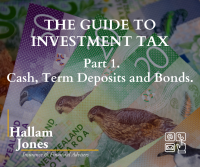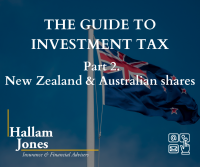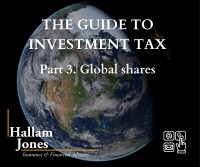Latest News
Categories
Recent Articles
The Guide to Investment Tax
It's important to understand the difference between investment tax rates and personal tax rates when saving for retirement or if you have already retired. In New Zealand, individual income tax rates range from 10.5% to 39%. We assume that you are aware of your personal tax rate. As an investor, you have the option to pay more or less tax, depending on the type of investment you make and the vehicle you hold your investment in. This guide explains how three (4th to follow) of the most commonly used investments are taxed and outlines legal steps you can take to reduce your tax rate and maximize your returns.
Part 1. Cash, Term Deposits and Bonds

In New Zealand, bank accounts offer low-interest rates on cash deposits. However, by investing in term deposits, you can earn higher rates of interest. Term deposits require you to lock up your money for a period of time, ranging from 3 months to 5 years.
If you hold cash, term deposits, or bonds in your own name or in a joint account, the interest you earn is taxed at your marginal tax rate. If you hold them in a family trust, the trustee tax rate is 33% but will increase to 39% from 1 April 2024.
To pay less tax on the interest earned, holding cash, term deposits, or bonds through a Portfolio Investment Entity (PIE) is recommended. In a PIE, your maximum tax rate is only 28%, which is 11% less than the maximum tax rate for individuals or trusts.
Part 2. New Zealand and Australian Shares

Over the past 40 years, the New Zealand share market has grown to over 186 listed shares worth $100 billion. It's one of the highest dividend-paying markets globally, ideal for retirement savings.
If you own NZ and Australian shares and don't trade frequently, you'll pay no tax on capital gains. Tax on dividends you receive will be at your salary tax rate (up to 39%).
If you own shares in a family trust, you'll pay a 33% trustee tax rate (increasing to 39% from 1 April 2024). You don't pay taxes on capital gains, but you'll pay a 33% tax on dividends (increasing to 39% from 1 April 2024).
If you own shares through a PIE, you pay no capital gains tax, and the maximum PIE tax rate is 28%. You don't need to pay additional taxes on dividends if they're fully imputed. PIEs are available for individuals & trusts with Hallam Jones.
Part 3. Global Shares

Most global shares in New Zealand are taxed based on an assumed total return of 5% p.a. regardless of their actual return. The only tax you pay is calculated by multiplying the 5% deemed return by your marginal tax rate. For example, if you're on a 39% tax rate, you pay 1.95% tax on your investment. If your global share portfolio makes a loss in a year, there is no tax to pay. The tax calculation is the same for individuals and trusts, and the maximum tax rate is 39%. However, if you own global shares through a PIE, then your maximum PIE tax rate is only 28%, and your tax rate on global shares is 1.40% p.a. PIEs holding global shares are available at Hallam Jones.

Contact Us, Hallam Jones
Phone the team on 0800 404 202 or (07) 348 3161 or email us through our contact form
This content has been provided for information purposes only and is not intended as a substitute for specific professional advice on investments, financial planning or any other matter. Read our disclaimer notice and privacy statement.





